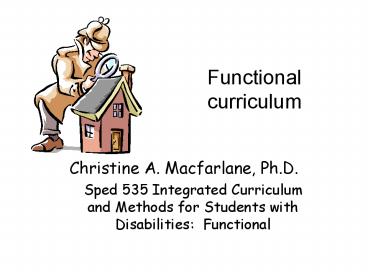Functional curriculum - PowerPoint PPT Presentation
1 / 36
Title:
Functional curriculum
Description:
Demanded in everyday activities and environments, both in and ... at object permanence, public library outing in afternoon, play story tape in evening at home ... – PowerPoint PPT presentation
Number of Views:385
Avg rating:3.0/5.0
Title: Functional curriculum
1
Functional curriculum
- Christine A. Macfarlane, Ph.D.
- Sped 535 Integrated Curriculum and Methods for
Students with Disabilities Functional
2
Skills must be chronologically age-appropriate
- Can interview peers
- Survey peers
- Observe peers
Clip art licensed from the Clip Art Gallery on
DiscoverySchool.com
3
Functional skills
- Immediately useful
- Demanded in everyday activities and environments,
both in and out of school - Result in greater independence less dependence
- Allow access to less restrictive environments
4
Criterion of ultimate functioning
- Skills that adolescents and adults with severe
disabilities would need in order to function as
effectively and independently as possible in
vocational, residential, and social environments - Should reflect need for transitions from one
environment to the subsequent or next environment
5
Criterion of the next environment
- Skills a student needs in the next educational
environment
6
Criterion of the immediate environment
- Consider needs for student to function in the
immediate or current environment(s)
7
Criterion of the least dangerous assumption
8
"A functional curriculum could be defined as the
life skills needed by a student in the current
environment in which he or she was functioning,
the life skills needed in the student's immediate
next education environment, and the skills the
student would need after leaving school to
function in vocational, residential, and
recreational environments."
9
Personalized Curriculum
10
Domains of Adult Life Skills
Community
Domestic
Leisure/Recreation
Vocational
Clip art licensed from the Clip Art Gallery on
DiscoverySchool.com
11
Ecological inventories
- A systematic, flexible process for determining a
scope and sequence of functional living skills
12
Relationship of domains
- Not all skills fit tidily into one domain.
- Many have application across more than one
domain. - "More bang for the buck".
13
Related skills
Functional academics
Communication skills
Motor skills
Social skills
?
Clip art licensed from the Clip Art Gallery on
DiscoverySchool.com
14
Community-Referenced Instruction
- Aligning assessment and instruction to the
natural cues in the environment - Referencing instruction to your community!
15
Life in a Greek Hotel
16
(No Transcript)
17
(No Transcript)
18
(No Transcript)
19
(No Transcript)
20
(No Transcript)
21
Oregon Statewide Assessment
- Extended CIM
- Math
- Reading
- Writing
- Extended Career Life Role Assessment System
(CLRAS)
22
Principal of partial participation
- Can't deny child access because of physical or
cognitive deficits - Individuals with (severe) disabilities can
acquire many skills that will allow them to
function, at least in part, in a wide variety of
least restrictive environments and activities.
23
The child should be allowed to participate in the
activity even when
- the child does not exhibit all the necessary
prerequisite skills, - the child will not be able to acquire all
components of the skill, - the child may not complete the entire activity or
skill independently, and - the child's developmental age is lower than his
or her corresponding chronological age.
24
Frequently thought of as providing physical
assistance, but that is too narrow a definition
- Can be physical assistance
- Can be a prosthesis
- Can be communicative in nature to determine
quality or make choices.
25
Types of adaptations
- Provide personal assistance
- Modify skills or activities
- Use an assistive device
- Modify the physical and social environments
Orelove Sobsey, 1996
26
Can't always come up with a modification that
will allow the person to function independently,
but can increase level of participation and thus
independence.
27
Patterns of error in using partial participation
Ferguson Baumgart, 1991
28
Passive participation
- Sitting in a classroom, i.e., just being present,
doesnt necessarily make it active participation - Example going to music class, but not being
able to sing or play the instruments - Nonexample Listening to a book being read
29
Myopic participation
- Focus is too narrow, doesnt meet full needs of
student, family, or community - Example parent requests help with shopping
teacher implements in nongeneralizable environment
30
Piecemeal participation
- Not connecting in-class instruction with
out-of-class instruction throughout the day - Example Instructional lesson aimed at object
permanence, public library outing in afternoon,
play story tape in evening at home
31
Missed participation
- The length of time required to learn to do
something independently may be too time
consuming, might be better to simply rely on
personal assistance, so valuable time can be
spent learning other skills as well - Example Cant grasp items in cafeteria to place
on tray, cant carry tray. Since there are
always people present in the cafeteria, might be
better to just leave it at that.
32
Remediation strategies
33
Active participation
- Rather than worry about expanding a behavioral
repertoire, concentrate on strengthening a small
set of behaviors
34
Attend to multiple perspectives
- Use family and community-referenced assessment
- Use ongoing instructional information systems
- Use ongoing outcome information systems
35
Use information from multiple sources
- Merge competing perspectives
- Ongoing planning and program improvement
36
Enhance image and achieve interdependence































